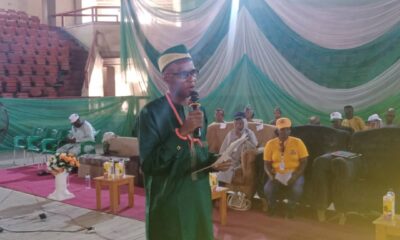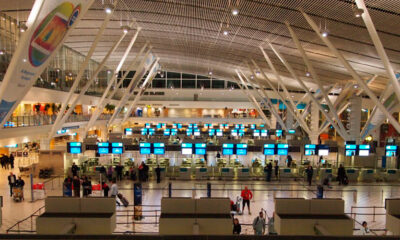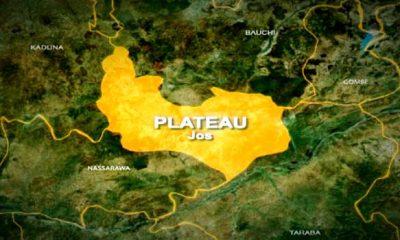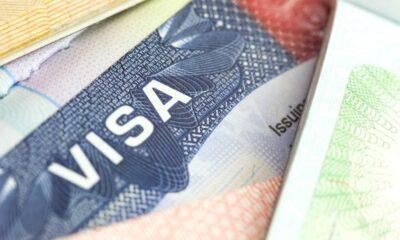Business
Debt Servicing Gulps N13.17tn Under Buhari, Education Suffers
Published
2 years agoon
By
Editor
The Federal Government spent nothing less than N13.17tn between 2016 and March 2022 under the regime of President Muhammadu Buhari an analysis by The PUNCH has revealed.
Findings by The PUNCH also showed that during the same period, the government budgeted N4.4tn for education amidst constant criticism by stakeholders, including the Academic Staff Union of Universities, about the low funding of the sector.
According to the information from the Debt Management Office, from 2016 to March 2022, servicing local debts gulped N10.77tn, while the government spent N2.40tn ($7.84bn) to service external debts.
The amount spent on external debt servicing was converted to Naira at the CBN’s exchange rate for the year. For instance, the naira-dollar average exchange rate for 2016 was N197 and N305 in 2017 respectively. It was N305 in 2018 and N360 in 2019. It closed at N380 and N420 in 2020 and 2021 respectively.
From January to December, a total of N1.23tn was spent to service the country’s domestic debts in 2016, during the same year N369.60bn was budgeted for education.
READ ALSO: Nigeria’s Debt To World Bank Rises By $660m
The figure for domestic debt servicing rose to N1.48tn in 2017 while the budget for education in the same year was N550bn.
In 2018, the country’s domestic debt servicing bill rose to N1.8tn with education at N605.8bn.
The cost of domestic debt servicing came down a bit in 2019 to N1.69tn with N620.50bn budgeted for education.
In 2020, debt servicing rose again to N1.85tn with education gulping N671.7bn. By 2021, domestic debt servicing rose to N2.05tn with education gulping N742.52bn.
On the other hand, external debt servicing gulped $353.09m in 2016. It went up to $464.05m in 2017 and jumped up to $1.47bn in 2018.
In 2019, the country spent $1.33bn on external debt servicing. In 2020, external debt servicing gulped $1.56bn. By 2021, it became $2.11bn.
Between January and March 2022, Nigeria spent N668.69bn on domestic debt servicing, while it spent $548.79m on external debt servicing while education gulped N923.79bn.
The United Nations Educational, Scientific and Cultural Organisation has recommended a benchmark of four to six percent of Gross Domestic Product or 15 to 20 percent of a country’s budget for education.
However, in the seven years of the Buhari regime, the highest allocation was in 2017 when a total percentage of 7.38 was allocated to education.
Experts lament
Commenting on the amount the government spent on debt servicing and low funding of education, experts, in separate interviews with The PUNCH, lamented that educational infrastructure was collapsing because of a shortage of funds.
They noted that the government failed to realise that education is the bedrock of national development.
A professor at the Adekunle Ajasin University, Akungba, Victor Olumekun, in an interview with The PUNCH, lamented the government had not focused on the education sector.
READ ALSO: Amid Rising Debt, Subsidy Cost Jumps By 370%
Also, the General Secretary of COEASU, Dr Ahmed Lawal, said the government spent money on projects whose contract sums were inflated.
While commenting on the development, the ASUU Chairman at the Federal University of Technology, Minna, Dr Gbolahan Bolarin, said the government did not care about education.
But a foremost economist, Bismarck Rewane, stated, “The debt service is necessary to finance the expenditure that was incurred. There is a crisis in the education sector, no question about it and the strike is only a symptom of the fundamental defect in the education system. I’m saying that the amount spent on education should be increased but because the revenues are down, we can only increase it by borrowing more so we cannot, on the one hand, criticise the government for borrowing more and at the same time criticise the government for spending less.”
On his part, the Director, Research and Strategist, Chapel Hill Denham, Tajudeen Ibrahim, stated that the future of education funding in Nigeria was bleak.
He stated, “I think the future of education funding in Nigeria is weak because it doesn’t seem like the government has a concrete plan for the education sector. In as much as that sector is not seeing inflows from investments, what would happen is either the government borrows to finance that sector or they neglect that sector, just like they are currently doing. Education doesn’t bring much income as a sector, it is a sector that the government has to invest in for long-term benefits.”
An economic expert and seasoned academic at Pan Atlantic University, Dr Olusegun Vincent, explained that the moment there was a debt obligation, it becomes a first line charge in revenue, irrespective of other priorities whether education, agriculture, or defence.
Varsity lecturers, others
The spending on debt servicing and the education sector came to the fore on Thursday as findings by our correspondents showed that lecturers in universities, polytechnics and colleges of education had embarked on no fewer than 837 days of strike since the inception of the regime of the President, Major General Muhammadu Buhari in May 2015.
ASUU is currently on strike in protest against members’ poor welfare and lack of adequate funds for universities among others.
The members of the Colleges of Education Academic Staff Union recently suspended strike for a period of 60 days which, according to the union, will give the government enough time to meet the demands tabled while the Academic Staff Union of Polytechnics suspended its strike on May 29, 2022.
The analysis by one of our correspondents revealed that in January 2017, ASUP, under the then national president, Usman Dutse, embarked on a seven-day warning strike from January 30, 2017, to February 5, 2017.
Also, ASUU declared an indefinite strike on August 17, 2017, over unresolved and contentious issues with the Federal Government. The strike was called off on September 17, 2017.
A few days after the suspension of the strike by ASUU, lecturers in polytechnics on November 11, 2017 announced another strike which lasted for 15 days. The strike was called off on November 29, 2017.
In 2018, lecturers in Colleges of Education took the lead when COEASU embarked on a strike on October 9, 2018. The strike was called off on December 5, 2018.
READ ALSO: Marketers Threaten To Halt Fuel Supply In North-West States Over N40bn Debt
ASUU embarked on a three-month nationwide strike on November 4, 2018, due to the Federal Government’s alleged inaction. The strike was suspended on February 7, 2019.
Similarly, ASUP embarked on strike again on December 12, 2018 and also called off its strike on February 13, 2019.
In 2020, ASUU initially embarked on a two-week warning strike.
The warning strike was followed by the longest strike in Nigerian history.
The strike which commenced in March 2020 lasted for a total of 270 days.
The pandemic, according to some stakeholders, added to the extension of the strike which was called off in December.
In 2021, while other academic unions took a break from industrial actions, ASUP embarked on 65-day strike. The strike, which commenced on April 6, 2021, was called off on June 9, 2021.
So far in 2022, ASUU has been on strike for close to 186 days with no end in sight.
While ASUP went on strike for just two weeks, COEASU strike lasted for two months before it called for a suspension.
PUNCH.
You may like


Hajj: Five States With $383m Debt Budget N9bn For Pilgrims


Full List: 13 New Governors Borrowed N226.8bn In Six Months – DMO


Nigeria’s Debt Hit N97.34tn In Q4 2023 – DMO


Nigeria Borrowed $1.21bn As Investors Shun 28 States


Nigeria’s Debt Jumps By 75% In Three Months, Hits N87tn


FG Spent N408.5bn On Debt Servicing In February – Report

The Central Bank of Nigeria (CBN) started fresh and direct sales of US dollars at N1,021 per dollar to Bureau De Change operators.
Nigeria’s apex bank disclosed this in a circular signed by its Director of Trade and Exchange Department Hassan Mahmud.
“We write to inform you of the sale of $10,000 by the Central Bank of Nigeria (CBN) to BDCs at the rate of N1,021/$1. The BDCs are in turn to sell to eligible end users at a spread of NOT MORE THAN 1.5 percent above the purchase price,” the circular posted on its website read.
READ ALSO: Tinubu Unveils African Counter-Terrorism Summit
“ALL eligible BDCs are therefore directed to commence payment of the Naira deposit to the underlisted CBN Naira Deposit Account Numbers from today, Monday, April 22, 2024, and submit confirmation of payment, with other necessary documentations, for disbursement of FX at the respective CBN Branches.”
CBN’s move is coming as the naira is recording a slight depreciation against the dollar after weeks of gains.
In late March, the bank also sold $10,000 to each of the eligible Bureau De Change (BDC) operators in the country at the rate of N1,251/$1.
READ ALSO: Mixed Reactions Trail Video Of Couple’s Customised N200 Notes
Like in the most recent sales, it warned BDCs against breaching terms of the dollar sales, vowing to sanction defaulters “including outright suspension from further participation in the sale”.
The fortunes of the naira have fallen sharply since President Bola Tinubu took over in May. Inflation figures have reached new highs and the cost of living hitting the rooftops.
Nigeria’s currency slid to about N1,900/$ some months ago at the parallel market. But in recent weeks, it has gained against the dollar.
The Nigerian authorities have also doubled down on their crackdown against cryptocurrency platform Binance and illegal BDCs.
On March 1, the CBN revoked the licences of 4,173 BDCs over compliance failures.
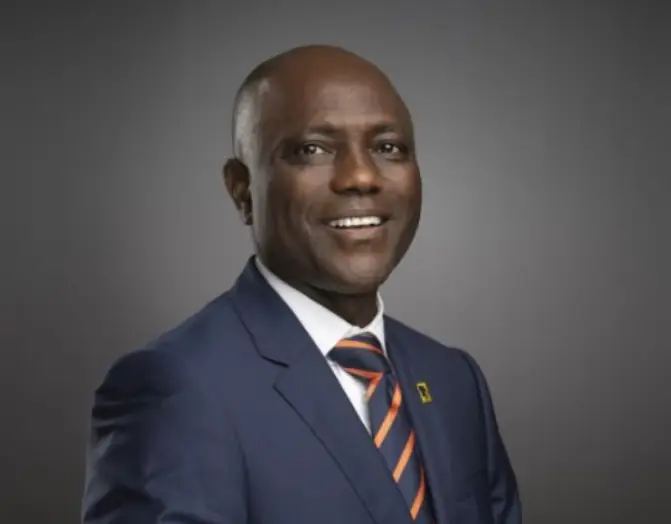
Olusegun Alebiosu has been appointed as the Acting Managing Director/Chief Executive Officer of First Bank of Nigeria Limited (FirstBank Group), effective April 2024.
Alebiosu steps into this pivotal role from his previous position as the Executive Director, Chief Risk Officer, and Executive Compliance Officer, a position he held since January 2022.
Alebiosu brings to the helm of FirstBank over 28 years of extensive experience in the banking and financial services industry. His expertise spans various domains including credit risk management, financial planning and control, corporate and commercial banking, agriculture financing, oil and gas, transportation, and project financing.
READ ALSO: JUST IN: Access Holdings Names New Acting CEO
Having embarked on his professional journey in 1991 with Oceanic Bank Plc. (now EcoBank Plc.), Alebiosu has held several notable positions in esteemed financial institutions.
Prior to joining FirstBank in 2016, he served as Chief Risk Officer at Coronation Merchant Bank Limited, Chief Credit Risk Officer at the African Development Bank Group, and Group Head of Credit Policy & Deputy Chief Credit Risk Officer at United Bank for Africa Plc.
Alebiosu’s academic credentials further enrich his professional profile. He is an alumnus of the Harvard School of Government and holds a Bachelor’s degree in Industrial Relations and Personnel Management. Additionally, he obtained a Master’s degree in International Law and Diplomacy from the University of Lagos, as well as a Master’s degree in Development Studies from the London School of Economics and Political Science.
READ ALSO: Meet Newly Appointed Union Bank CEO
A distinguished member of various professional bodies, including the Institute of Chartered Accountants (FCA), Nigeria Institute of Management (ANIM), and Chartered Institute of Bankers of Nigeria (CIBN), Alebiosu is renowned for his commitment to excellence and ethical practices in the banking sector.
Beyond his professional endeavors, Alebiosu is known for his passion for golf and adventure. He is happily married and a proud parent.
With Alebiosu’s appointment, FirstBank of Nigeria Limited anticipates continued growth and innovation under his leadership, reinforcing its position as a leading financial institution in Nigeria and beyond.
Business
CBN Gives New Directive On Lending In Real Estate
Published
7 days agoon
April 17, 2024By
Editor
The Central Bank of Nigeria, CBN, has released a new regulatory directive to enhance lending to the real sector of the Nigerian economy.
The directive, issued on April 17, 2024, with reference number BSD/DIR/PUB/LAB/017/005 and signed by the Acting Director of Banking Supervision, Adetona Adedeji, signifies a notable shift in the bank’s policy towards a more contractionary approach.
In line with the new measures, the CBN has reduced the loan-to-deposit ratio by 15 percentage points, down to 50 per cent.
This move aligns with the CBN’s current monetary tightening policies and reflects the increase in the Cash Reserve ratio rate for banks.
READ ALSO: JUST IN: CBN Gov Sacks Eight Directors, 32 Others
The LDR is a metric used to evaluate a bank’s liquidity by comparing its total loans to its total deposits over the same period, expressed as a percentage.
An excessively high ratio may indicate insufficient liquidity to meet unexpected fund requirements.
All Deposit Money Banks are now mandated to adhere to this revised LDR.
The CBN has stated that average daily figures will be utilised to gauge compliance with this directive.
Furthermore, while DMBs are encouraged to maintain robust risk management practices in their lending activities, the CBN has committed to continuous monitoring of adherence and will adjust the LDR as necessary based on market developments.
READ ALSO: JUST IN: CBN Increases Interest Rate To 24.75%
Adedeji has called on all banks to acknowledge these modifications and adjust their operations accordingly. He emphasised that this regulatory adjustment is anticipated to significantly influence the banking sector and the wider Nigerian economy.
The circular read in part, “Following a shift in the Bank’s policy stance towards a more contractionary approach, it is crucial to revise the loan-to-deposit ratio policy to conform with the CBN’s ongoing monetary tightening.
“Consequently, the CBN has decided to decrease the LDR by 15 percentage points to 50 per cent, proportionate to the rise in the CRR rate for banks.
“All DMBs must maintain this level, and it is advised that average daily figures will still be applied for compliance assessment.
“While DMBs are urged to sustain strong risk management practices concerning their lending operations, the CBN will persist in monitoring compliance, reviewing market developments, and making necessary adjustments to the LDR. Please be guided accordingly.”

How Yahaya Bello Moved $720,000 From State Coffers To Pay Child’s School Fees — EFCC

Nollywood Actor, Zulu Adigwe Is Dead

Meet 17-year-old Nigerian Who Won $3.5m Worth Of Scholarships From Harvard, 13 Other Foreign Universities
Trending

 Entertainment2 days ago
Entertainment2 days agoBridesmaids’ Dance At Wedding Causes Stir On Social Media [VIDEO/PHOTOS]

 Politics3 days ago
Politics3 days agoEdo Guber: Akoko-Edo PDP Leaders Meet In Igara, Describe Ighodalo, Ogie As ‘Perfect Match’

 Metro2 days ago
Metro2 days agoVIDEO: ‘UNN Lecturer’ Caught Pants Down With Married Student

 News4 days ago
News4 days agoFoundation Advocates Empowerment Of Women, Youth In Nigeria

 Headline5 days ago
Headline5 days agoBest Airports In Africa For 2024 Named, Nigeria Missing [Full List]

 Metro5 days ago
Metro5 days agoBREAKING: Protests As Gunmen Kill 12 In Plateau Village

 News2 days ago
News2 days agoOutrage As Chinese Supermarket In Abuja Denies Nigerians Entry

 News5 days ago
News5 days agoJUST IN: Tinubu Appoints SEC Chairman, Board Members

 News4 days ago
News4 days agoJapa: Types Of US Visa Available To Nigerians, Other Foreigners

 News4 days ago
News4 days agoWhy Police Detained Yahaya Bello’s ADC, Security Details Revelead












